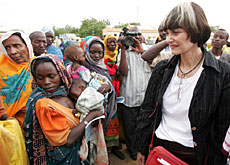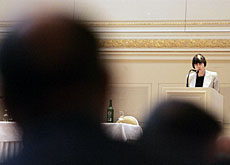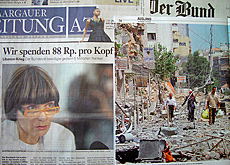Calmy-Rey says Switzerland is no “political dwarf”

Switzerland should not be seen as a "political dwarf" on the international scene, according to Swiss President Micheline Calmy-Rey.
Calmy-Rey, who is also the foreign minister, said the country was pursuing an “active, coherent and successful” foreign policy and Swiss neutrality was enabling it to actively promote peace while safeguarding its own interests.
“Switzerland talks with one voice abroad,” she said.
She made the comments in Bern on Friday at a presentation of four reports approved by the cabinet that describe the state of Swiss foreign policy.
Some elements of the reports, in particular the parts on Swiss neutrality, had been requested by the government following the bloody Lebanon crisis last year, which had led to differences of opinion between Calmy-Rey and the cabinet.
After hostilities between Israel and Lebanon-based Islamic organisation Hezbollah broke out on July 12, the Swiss foreign ministry was quick to take a firm line. But the rest of the cabinet took a more restrained stance: no condemnation of either party and no calls for a ceasefire.
“Neutrality is an asset in the current climate. Switzerland has no hidden agenda – it builds bridges,” Calmy-Rey said on Friday.
This position had allowed it to pursue a “niche” strategy in countries such as Colombia or Nepal, or over Iran’s nuclear programme.
For more than a year Switzerland has been involved in talks with all parties – Iran, the “P5+1” group comprising China, the United States, France, Britain, Russia and Germany, as well as the European Union and the International Atomic Energy Agency (IAEA).
The main aim is to prevent an escalation of the nuclear issue.
“A diplomatic solution is possible and necessary,” the report states. ” Switzerland is endeavouring to contribute to a resumption of dialogue between the parties by proposing balanced measures which are limited in time to both parties. Our steps and suggestions have been welcomed positively by all sides.”
United Nations
Calmy-Rey also declared that Switzerland’s role in the United Nations allows it a much greater influence than its geographical or demographical size.
One of the reports presented on Friday looks at the possibility of a Swiss seat on the UN Security Council. This should not be ruled out straight away, according to the authors.
Calmy-Rey ruffled the feathers of Swiss parties in the centre and to the right when she brought up this idea last August.
According to the report, the system of rotation in the Security Council for the ten temporary seats and presidency would give Switzerland the opportunity to highlight the topics which it holds dear.
Switzerland could, for example, help improve transparency within the council and exert a direct influence on decisions over peacekeeping or economic sanctions.
As to whether a seat would jeopardise Swiss neutrality, the report stressed that other neutral countries, such as Austria, Sweden, Finland and Ireland, have already sat on the council. If there is a vote on a sensitive issue, Switzerland could always abstain.
The report also notes that all countries are bound by measures taken under Chapter Seven of the United Nations Charter to maintain peace, whether they are members of the Security Council or not.
But the whole question remains theoretical, as Switzerland would have to wait at least 15 years before making an application and gaining a seat on the council.
swissinfo with agencies
Switzerland has in effect been neutral since 1515 after Swiss forces were defeated by the French at the Battle of Marignano in Italy.
Switzerland’s neutrality was recognised by the signatory states of the Vienna Congress in 1815.
Neutrality in the international context means the non-participation of a state in armed conflict between other nations.
Swiss neutrality was chosen freely, is permanent and allows the country to be armed for defence purposes.

In compliance with the JTI standards
More: SWI swissinfo.ch certified by the Journalism Trust Initiative











You can find an overview of ongoing debates with our journalists here . Please join us!
If you want to start a conversation about a topic raised in this article or want to report factual errors, email us at english@swissinfo.ch.